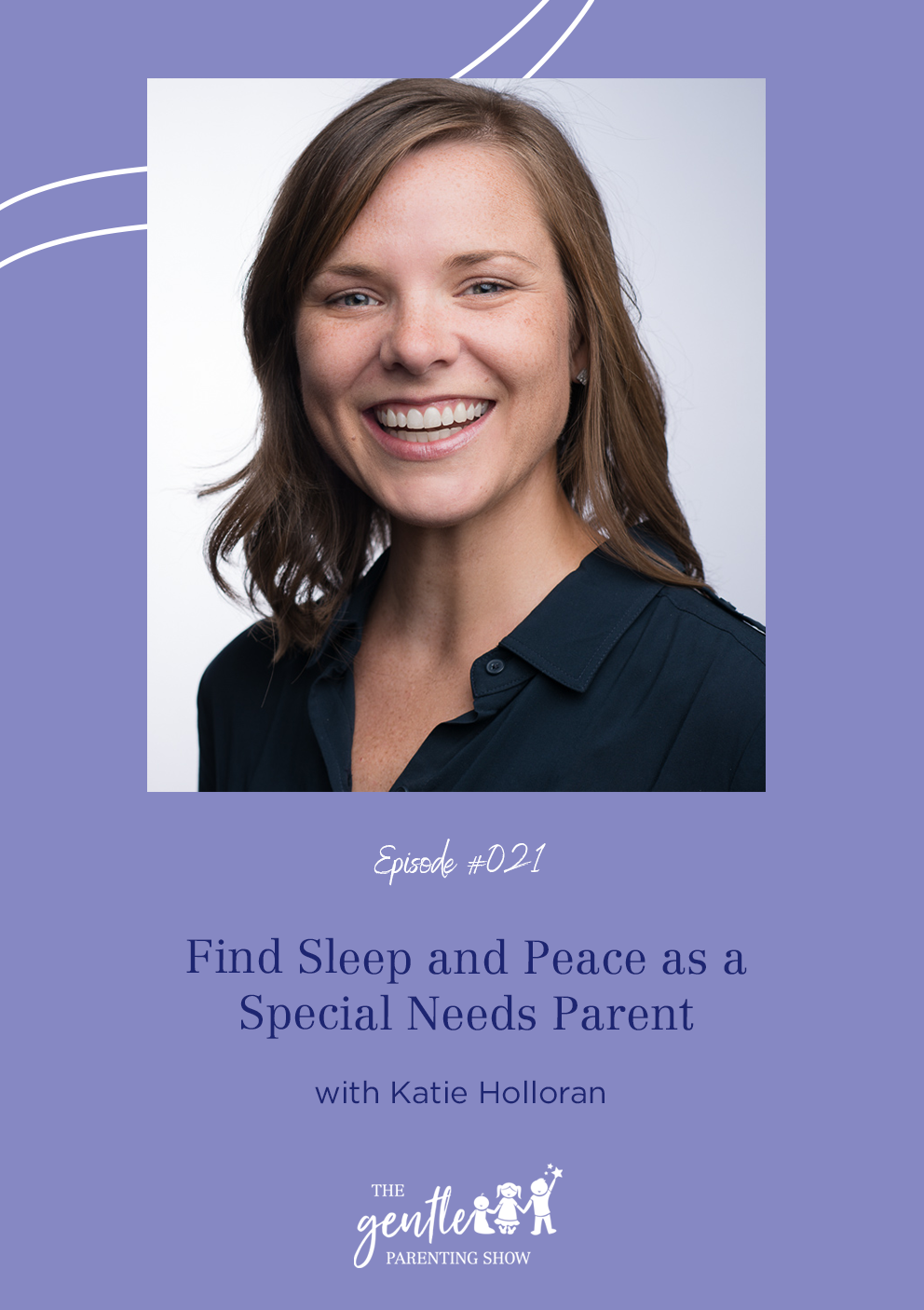.In today’s episode of The Gentle Parenting Show, Kim welcomed back gentle sleep coach Katie Holloran. Katie has earned her Master’s in Special Education. She has taught and worked with children with Autism and Developmental Delays in Public, Private and Charter schools. She co-authored a book with Kim West titled The Good Night Sleep Tight Workbook for Children with Special Needs in 2019. Her passion is helping families and special needs parent to understand the foundations of a supportive sleep environment and then applying that to their specific dynamic. Today, Kim and Katie talk about sleep training for special needs kid, especially as they get older, and how it is never too late to learn.
Sleep Training Neuro-typical vs. Noneuro-Typical Children
Katie first begins this discussion by pointing out studies and numbers that show how difficult sleep training can be for special needs children. She said that most research on this issue is parent-reported. The most recent research from Pediatrics in 2019 looked at 2-5-year-old children with and without developmental diagnoses.
It was found that about 80% of kids with autism and developmental delays reported sleep problems. That is more than double the 20-30% of neurotypical children with sleep problems. It can be easy for parents of special needs children to automatically assume their child will have sleep issues, but Katie shares some light and hope for those parents.
Finding Hope as a Special Needs Parent
As a special needs parent, it’s important to know that just because your child has a diagnosis of ADHD, autism, or any developmental delay, you won’t always struggle with sleep. Katies knows that it feels like they might go hand in hand, and there’s no other way. But, take it from Katie who has worked with 100’s children on the spectrum, it is possible.
The most important thing Katie teaches special needs parents is to look at sleep as a skill. This means that it’s something that can be taught. The good news is that no matter where your child is on the spectrum or no matter their age, they can learn! Now, this doesn’t mean that they’ll learn in 3 days or a few weeks without any problems. But, it does mean you can take the incremental steps to get better sleep. Most importantly, Katies says “never think it’s too late to work on sleep. It never is. You can absolutely make gains and teach skills no matter what.”
Using Your Child’s Team For Support
When it comes to teaching sleep to a special needs child, Katie advises parents to look at priorities. There could be medical needs or developmental needs that need to be prioritized before sleep. This is why both Kim and Katie advise working with your child’s team before you really start sleep training. A lot of times in medical settings or therapy settings, sleep doesn’t get mentioned or asked about. Katie advises making sleep issues known on both the medical and therapeutics side. She wants parents to have the conversation around sleep so it’s on everyone’s radar. A doctor or a therapist might advise coming back to the conversation, or they might have great ideas for medication or something that will help your child sleep.
Create Structure for Special Needs Parents
When Kim and Katie are helping a family with a special needs child, their first priority is to create structure to the day so there is predictability for sleep. This may mean that sometimes therapy, doctor, or other appointments need to be switched around. Children do better in treatments when they are well-rested and alert. As a special needs parent, you want your child to be open to learning and not to slug through every appointment and meeting.
Rearranging a schedule to prioritize sleep is often like completing a puzzle. As a family unit, parents need to look at where they can shift things around in the day. What is important? What is not? There may be days that compromises need to be made to benefit the family as a whole, but if you look at your schedule with sleep as a top priority, it will work out.
Bedtime Routine Tips for Special Needs Children
Katie’s biggest advice for a smooth bedtime routine with special needs children is to use visuals in all sorts of ways. She says that “anytime we can create a routine schedule into smaller pieces and create visuals around those pieces, it’s hugely beneficial to our children in creating those systems.”
No matter how long or short your bedtime is, it’s still a routine that your child relies on. Katie provides a template for creating a visual routine. First, if your child is particularly struggling with one aspect of their bedtime routine, make that the first step in their routine. Then, create a visual of every step of the routine in 1 line with a picture and a checkbox. This schedule should star your child, so use pictures of them brushing their teeth, putting on pajamas, being in the bath, reading a book, brushing hair, etc. Katie chooses to laminate this schedule for easy clean-up, but she says you can use a plastic sheet protector and dry erase marker as well.
Katie also advises using social stories as well. Similar to a routine checklist, make a whole book staring your child and their bedtime routine. Doing this in book format helps your child learn the needed skills of getting ready for bed. Katie loves using social stories for bedtime because the story doesn’t have to end with lights off, in bed. The story can include what a child does in bed to fall asleep. It can include a lovey, breathing exercises, mental exercises, etc. to help teach your child the skill of actually falling asleep.
Getting Your Special Needs Child to Fall Asleep
Katie has found that a lot of advice for special needs parents is to just close the door and hope their child falls asleep on their own. She finds a huge issue with this. First, there is a huge safety concern. If you just leave your child alone in their room, asleep or not, they can easily get up, get into things in their room or even end up wandering around the house. Mentally, leaving your child in their room alone makes them feel as if they are being punished or abandoned. Especially if you’ve previously been lying down with your child to get them to sleep, all of a sudden leaving the room is a massive jump that is mentally taxing on your child. Going “cold turkey” feels and looks a lot different to your child.
Instead, Katie advises taking small, incremental steps to teach your child to sleep independently. She says “there’s a balance of supporting your child in a new place, but also making progress towards that goal of learning a skill.” It is also important to know that these small incremental steps can take longer, but will be more effective.
An example Katie gives is that if you were previously laying with your child to get them to sleep, try sitting at the foot of the bed for a few nights. You are still there supporting them to fall asleep with verbal and physical reassurance. Then, you can continue to move further away throughout the room in incremental steps until you are eventually out of the room. With these steps, Katie says “any step we make is monumental. That’s huge and should be honored and celebrated.”
Kim believes that her method, The Sleep Lady Shuffle, is really effective for kids with special needs. These children already struggle with self-regulation, so they need support from their parents. Kim finds that just shutting the door and walking away creates anxiety. Especially in a special needs child, this isn’t even necessary. Plus, a lot of families feel more comfortable with the Sleep Lady Shuffle because they can be more consistent with a gentle approach. Consistency is everything in sleep training.
Takeaways for A Special Needs Parent
Katie tells parents that our behavior as adults is really important in the sleep training process. Because of this, Katie wants parents to step back and think about if they are really ready to sleep train. Sleep training can be mentally taxing. If there are more important things for parents to worry about, they need to focus on those things first.
When teaching sleep to a special needs child, the parents set the tone for their kids. Katie says, never try and trick your kids. They will figure it out. Be open and honest with them about what you’re doing, and why. Explain to them why you’re no longer laying down with them to fall asleep. Be positive and honest.
A lot of special needs parents come to Katie saying their house feels chaotic and they don’t have it in them to sleep train. She says that it’s ok to feel like that. Parents have to do what they have the bandwidth for. There are baby steps they can take to make it seem more manageable.
Most important, Katie wants special needs parents to know that it’s never too late to teach sleep. If you aren’t ready in an exact moment, it’s ok. You can wait until you feel all in and ready to take the steps to sleep train.
Connect with Katie
- Katie’s WEBSITE






